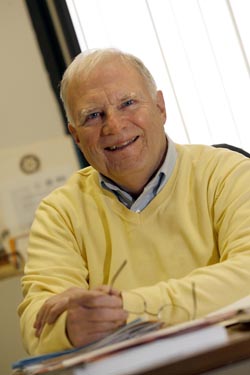|
Aiken acknowledges that it's an "ambitious" timeline, but given the administration's "spirit of collaboration and cooperation," he's confident the plan will be produced by the deadline, with faculty voices fairly represented.
"President Hart and Provost Staiano-Coico want this to be a faculty-driven, open and transparent process," Aiken said.
Staiano-Coico has asked the senate to nominate a minimum of 35 faculty members — roughly two from each school or college — to populate committees that will prepare parts of the academic strategic plan.
Other major items on the senate's agenda include the implementation of the program for General Education (or Gen Ed), which is scheduled to be up and running in fall 2008; wrestling with the issue of senate membership eligibility for non-tenure-track faculty members, a motion in support of which nearly passed last year; and continued participation in Temple's top administrative searches, including several deanships.
An expert in artificial intelligence, educational uses of computers, and more recently the use of online collaborative models and tools, Aiken has found ways to apply his experience as a scholar in his role as a faculty leader.
"In my field, it's critical to think of long-term social impacts of technologies," he said. "My students need to understand the impacts of the software they build. As faculty members, we need to think the same way. The academic strategic plan and the Gen Ed program will have far-reaching repercussions for the whole Temple community."
To foster a sense of community and offer non-faculty perspectives, the senate's leadership has been inviting administration guests to senate meetings to address specific issues of interest to faculty members. On Friday, Dec. 7, at 1:45 p.m. in Ritter Hall's Kiva Auditorium, the senate will welcome Vice President William T. Bergman and Vice President for Student Affairs Theresa A. Powell to its once-a-semester University Senate Meeting for a discussion about emergency response and mental health care initiatives at Temple.
"I invite all faculty members to come," Aiken said. "We need their ideas and their energy. If I have one goal as Faculty Senate president, it's to strengthen faculty roles in all aspects of the university's decision making — but that can't happen if people don't get active, volunteer to serve on committees, attend meetings and speak out. The Faculty Senate is our voice; we need everyone to participate."
The Dec. 7 University Senate Meeting is one of two such meetings a year; it’s open to all full-time faculty. Representative Senate Meetings are held from September to April and are open to all, but voting privileges are extended only to the representative senators.
The agenda for meetings is arranged by the Faculty Senate Steering Committee, which consists of one representative from each school or college and meets every Tuesday afternoon.
Faculty Senate President Robert Aiken urges all faculty, including those who aren’t members of the Representative Senate and who are non-tenure-track members, to speak out. He encourages faculty members to contact their school’s or college’s representative on the Faculty Senate Steering Committee (see list below) if they have opinions to share or wish to suggest issues for senate consideration.
• President: Robert M. Aiken
• Vice president: Karen M. Turner
• Secretary: Paul S. LaFollette Jr.
• Past president: Jane DeRose Evans
• Ambler College: Pauline Hurley-Kurtz
• Beasley School of Law: Diane C. Maleson
• Boyer College of Music and Dance: Luke Kahlich
• College of Education: Joan Poliner Shapiro
• College of Engineering: Z. Joan Delalic
• College of Health Professions: Ann E. Barr
• College of Liberal Arts: Judith Goode
• College of Science and Technology: Joel B. Sheffield
• Fox School of Business: Bonnie Averbach
• Kornberg School of Dentistry: Roy H. Stevens
• School of Communications and Theater: Roberta Sloan
• School of Hospitality and Tourism Management: Ira G. Shapiro
• School of Medicine: David A. Baron
• School of Social Administration: Bernie S. Newman
• Tyler School of Art: Therese Dolan
|
